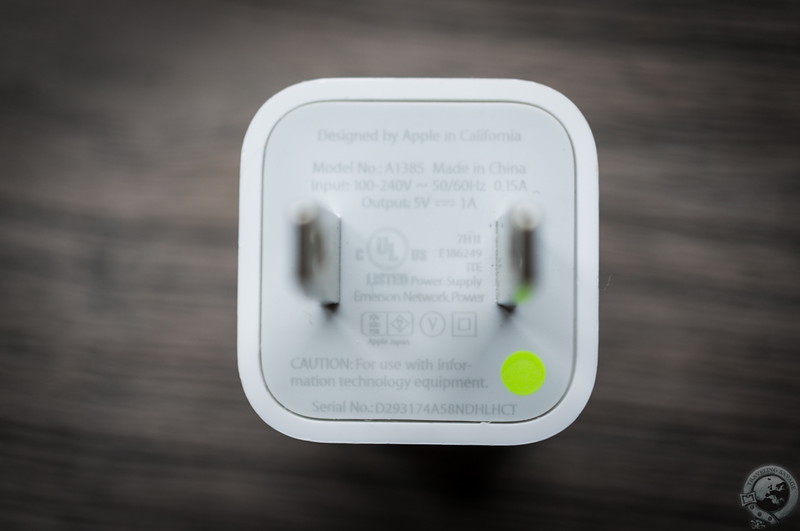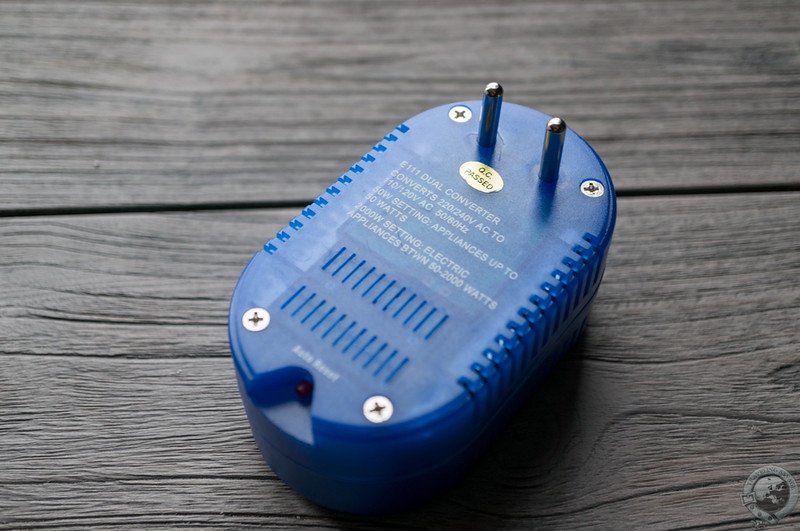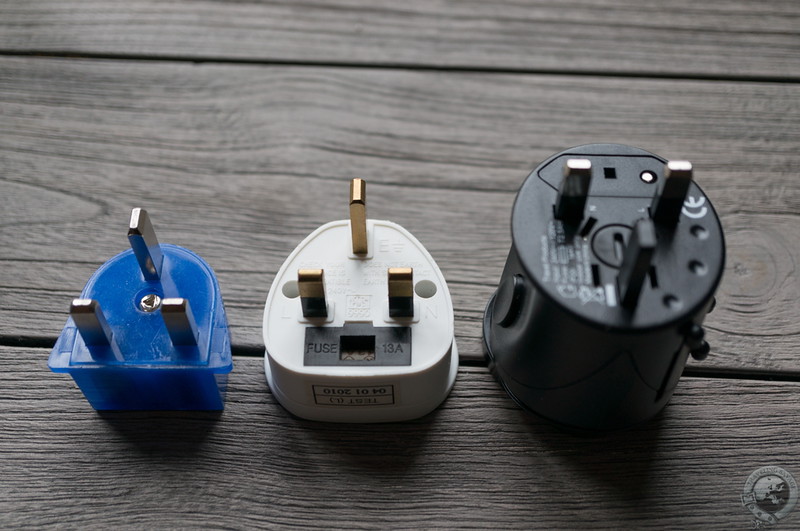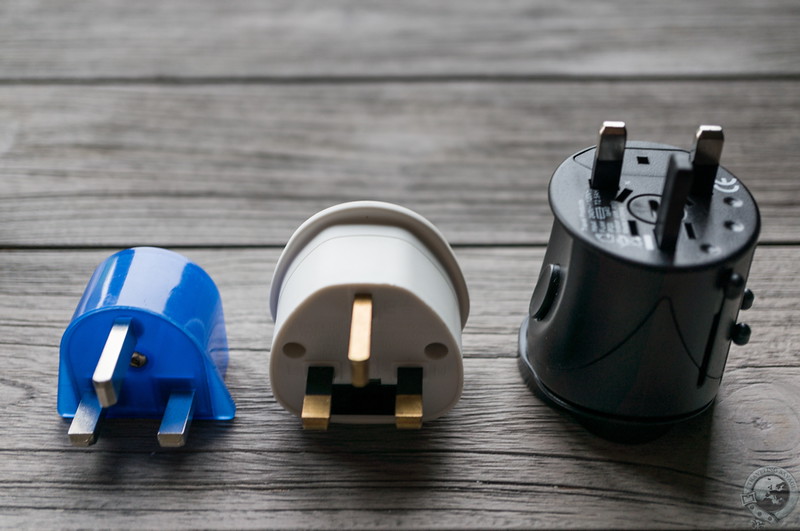In the last month I’ve written a couple of posts aimed at preparing first-time travelers to Scotland for a wonderful trip. I’ve tackled Scotland’s incredible right-to-roam policy and renting a car, and today I continue this so-called “Know Before You Go” series with another practical topic: Voltage, adapters, and things electrical. This is far from the sexiest thing to write about, but, since I can’t seem to travel without lugging around at least four devices, getting it wrong hurts.
There are two main areas you need to consider when ensuring your devices will work in other countries: Voltage and outlet adapters. Voltage is the “power” of the electricity coming through the outlet to devices. In most of the world (including Scotland), outlets are calibrated to 220v-240v. In the United States, however, our outlets are calibrated for 120v. The higher voltage in Scotland and other places is the result of a more modern electrical infrastructure that provides greater flexibility and nominally better energy efficiency. The United States’ more archaic system is simply the cost of being a pioneer.
What does this mean for travelers? Every device that can be charged via outlets is built to accept a certain voltage range. You need to ensure that your device can handle the higher voltage in Scotland. For example, though it’s a bit hard to see, the iPhone plug below lists the input as 100-240v. This means you can plug it into Scottish outlets with just an adapter (see below). It does not require a voltage converter.
Voltage converter? Some older devices and appliances like hair dryers and curling irons may only accept 120v. If you tried plugging those into Scottish outlets you’d risk frying the device. In this situation, you need an adapter AND a voltage converter (pictured below). The converter steps down the voltage to the lower American voltage of 110v/120v. These days, most devices like laptops, smartphones, surfaces, etc. do not require a voltage converter, and truthfully I can’t remember the last time I brought one on a trip. The key here is to check all your devices to see what voltages they accept. If any list only 110v/120v, then you need to bring a converter.
Adapters are the other main concern. Outlet sockets in Scotland and the UK are different from the rest of the world. Everyone is different from everyone, really. As you can see in the pictures of UK adapters below, the adapters you need to use in Scotland have three massive, rectangular prongs spaced fairly far apart. The backsides of these adapters fit just about every other plug configuration on the planet. The number of adapters you want to bring depends on the number of devices you have, but trust me when I tell you that you don’t want to be fighting with your significant other for charging time. Just think of all the things you might need to charge: Laptop, phone, iPad, kindle, camera batteries, etc.
Important note: If you have any grounded, three-prong plugs, be sure to purchase an adapter that accepts three-pronged plugs. You can’t see it in the photo below, but the beige adapter accepts three-pronged plugs and the blue one does not. It seems obvious, but I made this mistake on a recent trip to Switzerland.
It’s as simple (and complicated) as that. To summarize:
- Gather together the devices you intend to bring.
- Check what voltages they accept.
- If necessary, purchase a voltage converter (for those devices that only accept 110v/120v).
- Purchase UK outlet adapters for both grounded and non-grounded plugs.
You will now never be without sweet electricity on your trip to Scotland. Just don’t forget to flick on the switch on the outlet first! Questions? Throw them in the comments!
Next week: A look at my packing list for Scotland.





Do you have your packing list done? I’m leaving on the 23rd and want to pack light. I keep changing my mind.. Will be there til mid June. Any suggestions? Torrid on and Lochleven area.
You can avoid conflict with your SO over access to chargers by using one of these –
6 gadgets can charge at the same time, and only one adapter is needed, so less bulky to carry about. Also – sockets/outlets are sometimes at a premium in smaller hotels and B&Bs – a unit like this (others are available) takes care of that problem.
Hmm. I see links don’t work. WHat I suggested above, is a 6-port 60watt charger, available from a number of suppliers, including A*mazon.
Hi Keith–
Any chance you can send me a first draft of the “what to pack” article? We’re leaving on Friday the 13th (yikes) for Scotland!
Lee
Sorry, folks – I don’t have the packing list put together yet! Some tips though: Waterproof windbreaker with a hood, waterproof all-purpose shoes, and dress in layers.
Just as an additional bit of information, I’ve checked with all of the accommodations I have booked for our September trip, to see if any supplied a hair dryer. They all do. So, one less thing to pack. Some may even have adapters to borrow, but I would not count on the converter. All worth checking into beforehand.
[…] rest of the Smart Alec is filled with my laptop, external hard drive, iPad, iPhone, charging cords, UK outlet adapters, Mophie external battery to charge devices on long-haul travel days, and headphones. I stuff all […]
Something else to consider…*blush*… don’t ask me how I know this!
Having been to the UK before, on our three-weeker last August, we came (properly) equipped with adapters and made sure all of our electronic stuff was “dual voltage”…ie., things would run on either 120v or 240v. No issues there…
Now for WHATEVER reason, I threw in a 5-outlet power strip so we could plug any rechargeable stuff in in just one place instead of scattering things all over the room and using multiple UK-sty;e adapters. I, uh, forgot to check that the power strip was dual voltage. As a result, when I plugged it into the wall, with the UK adapter, it popped the breaker that controlled ALL the outlets throughout the entire place we were staying at!
Now we all know that when you do that at home, we go check the breaker, reset the one that popped and Bob’s your uncle. However, most places in the UK, the staff are NOT allowed to do that. They have to call an electrician to do it for them…a visit, flip the breaker, give the accommodations a bill…
LOL…don’t place yourself in that situation! 🙂
Whoops! Thanks for the hard-earned advice, Neil.
I will need a electric converter and an adapter to use for my hair styling brush for my upcoming trip to Scotland.
Is there an all -in-one converter with an adapter or will I have to purchase each piece separately?
Can you recommend a specific brand?
Many thanks
Betsy
Hi Betsy. Yes, you can find all-in-one items. Just check Amazon.
Hi
I get the 3 prong adapter. But the blue converter above has pins. Shouldn’t I be looking for a converter with 3 prongs?
I want a converter for my hair dryer. I want the adapter for electronics. Seems like I need both and both should have 3 prongs…?
Thanks for the elucidation!
L
Hi Laurie. The blue converter with pins plugs into a 3-prong adapter.
I recently read your informative article titled “Know Before You Go: Voltage Adapters in Scotland” and wanted to express my appreciation for the valuable insights and practical tips you shared. Your article serves as a helpful guide for travelers visiting Scotland, highlighting the importance of understanding voltage differences and providing guidance on voltage adapters.
I found your explanation of the voltage discrepancy between the United States and Scotland to be particularly helpful. Understanding the difference in voltage, as well as the varying plug types, is crucial for ensuring that electronic devices and appliances are compatible and can be safely used during travel.
Your detailed breakdown of the types of voltage adapters available, along with their compatibility and usage, is highly beneficial. The suggestions you provided on purchasing a universal voltage adapter or specific adapters for different devices are valuable for travelers who may have multiple electronic devices requiring different voltage levels.
Furthermore, your inclusion of practical tips, such as checking device compatibility, reading product labels, and considering the need for a voltage converter, offers additional guidance to ensure a smooth and hassle-free experience for travelers.
To enhance the article further, you could consider including information on where to purchase voltage adapters or converters in Scotland. Sharing specific stores or resources where travelers can find reliable and compatible adapters can be immensely helpful, especially for those who may not have purchased one in advance.
Additionally, providing examples or stories of travelers who faced voltage-related challenges in Scotland and how they resolved them could make the article even more relatable and engaging. Real-life anecdotes can help readers better understand the practical implications of voltage differences and the importance of being prepared.
Overall, your article on voltage adapters in Scotland is an excellent resource for travelers. By addressing the specific needs and considerations related to voltage differences, you empower readers to plan and prepare accordingly, ensuring a seamless experience during their time in Scotland.
I appreciate the personal touch you bring to your travel experiences, offering insights that go beyond the typical tourist spots. It’s evident that your passion for exploration shines through every post.
Traveling from US. I just got a G adapter. Two prongs are metal and one is plastic. Is this going to work in Scotland?
Between you and my husband I got quite the education. My husband got his education from your article. I now know what to look for and how to use the information. Then I learned the difference with a convertor and an adaptor. I’m a real smarty pants now because of your information. Now to educate my sister.
Toronto Wiring offers top-quality electrical services in Toronto, specializing in residential, commercial, and emergency solutions. Our experienced electricians are dedicated to providing safe and reliable electrical installations, repairs, and upgrades. Whether you need a simple repair or a complete electrical overhaul, Toronto Wiring has you covered. Contact us today for dependable electrical services in Toronto!
https://torontowiring.com/electrician/